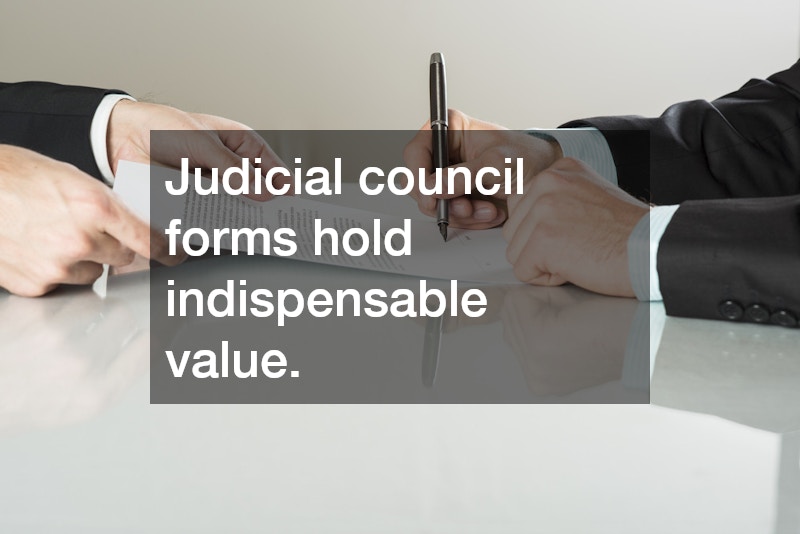Judicial council forms are a crucial component of the legal landscape, as they facilitate the standardized flow of information within the judicial system. Used across various legal processes, these forms ensure consistency and clarity in the documentation that courts require from the public, attorneys, and other legal entities. By providing a uniform platform for submitting necessary information, judicial council forms help streamline the judicial process, reducing delays and confusion.
In today’s complex legal environment, understanding and correctly utilizing these forms is essential for anyone involved in legal proceedings. This article aims to explore the significance of judicial council forms and their impact on the judicial system.
Standardization and Clarity
One of the primary reasons judicial council forms are essential is their role in standardizing legal documentation. Without a standardized form, courts would face rampant inefficiencies due to variations in how information is presented. By using the same format, judicial council forms help eliminate ambiguities that could otherwise lead to misinterpretation or errors. This standardization is especially beneficial for individuals unfamiliar with legal jargon, as it provides clear guidelines on the information required. Moreover, the clarity provided by judicial council forms helps ensure that all relevant details are appropriately documented, ultimately aiding in accurate and fair decision-making within the judicial process.
Standardization through judicial council forms also serves to streamline operations within the judicial system. By using these forms, courts can quickly assess the completeness and validity of submitted information, reducing the time spent on verifying the details across various documents. This streamlining process not only eases the workload for court personnel but also enhances the overall efficiency of legal proceedings. The standardized nature of these forms further facilitates accurate data entry and seamless electronic record-keeping, contributing to a more organized and accessible legal database. Consequently, this organized system reduces bottlenecks and helps maintain the momentum of proceedings.
Reduction in Legal Errors and Confusion
A significant advantage of maintaining judicial council forms is the mitigation of errors and confusion within legal submissions. Due to the structured nature of these forms, individuals are less likely to omit or misrepresent critical information when filing them with the courts. By providing guidelines on how to complete each section, judicial council forms help prevent misunderstandings that may arise from incomplete or inaccurate data entry. As a result, the forms help maintain the integrity of the information submitted, which is crucial for fair and just legal proceedings. Additionally, the straightforward process of filling out these forms encourages individuals to engage wholly with the necessary documentation, leading to more informed and responsible legal participation.
Moreover, judicial council forms establish a consistent reference point for all parties involved in the legal process. This consistency ensures that everyone operates based on the same set of facts, minimizing discrepancies in documentation due to varying interpretation of requirements. By presenting information in a uniform approach, these forms significantly reduce the possibilities for disputes arising from unclear instructions or divergent expectations. In turn, this minimizes the chance for prolonged delays caused by the need to revisit or resubmit unclear or incomplete submissions. Thus, the use of judicial council forms enhances the efficiency and reliability of the legal system.
Enhanced Access to Justice
Judicial council forms significantly contribute to improving access to justice by making legal processes more transparent and navigable for all individuals. The uniform design of these forms facilitates understanding of complex legal requirements, breaking down barriers that individuals might face when accessing the judicial system. In particular, self-represented litigants benefit from the clear instructions and simplified language provided within these forms, enabling them to competently engage with legal processes without necessarily requiring extensive legal expertise. As the forms democratize access to legal information, they empower a greater proportion of the public to assert their rights and seek justice when needed.
Judicial council forms hold indispensable value in streamlining legal processes, minimizing errors, and enhancing accessibility within the judicial system. Through standardization, these forms promote consistency and accuracy, key elements that underpin fair and efficient court proceedings. By lowering barriers to understanding and access, judicial council forms foster inclusivity and ensure that justice can be sought by individuals from diverse backgrounds. As the judiciary continues to evolve, the role of these forms remains central to maintaining judicial efficiency and fairness. Embracing the use of judicial council forms is a crucial step in fortifying the foundation of the justice system for the betterment of society as a whole.
.

